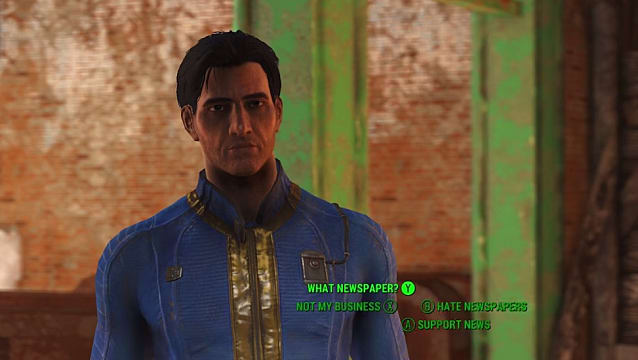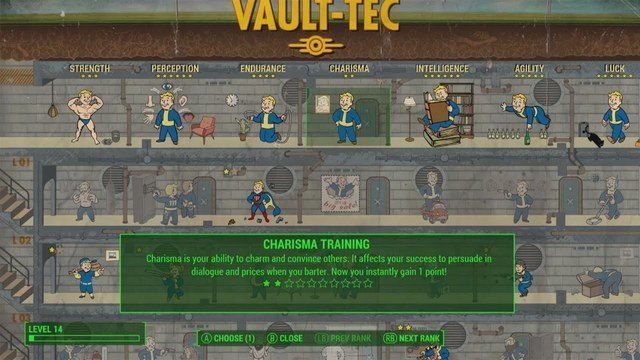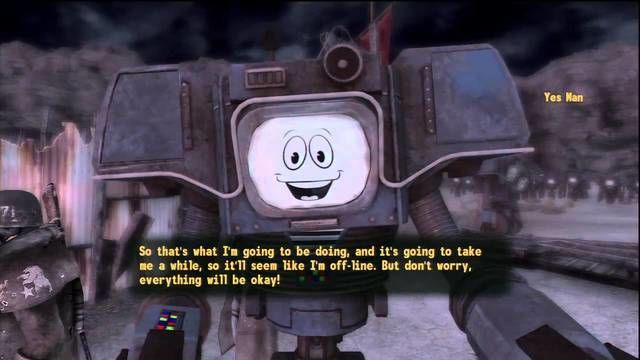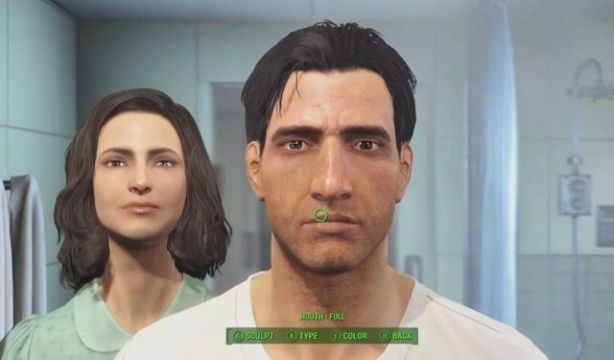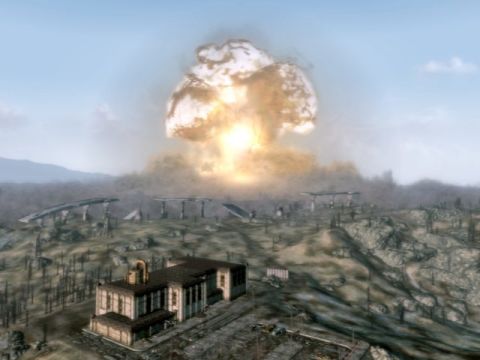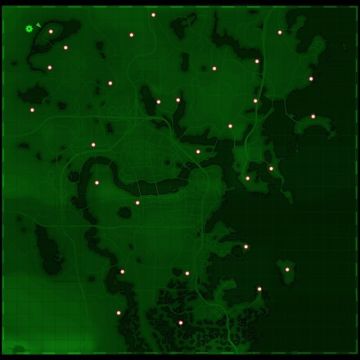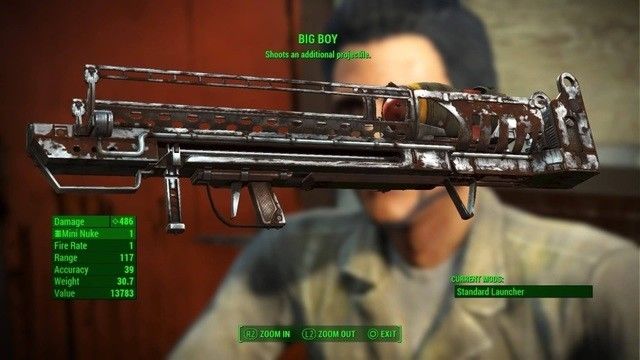Like most RPG enthusiasts, my next thought was: “What kind of character should I build next?”
Fallout 4’s mechanics make it so each character can be wildly different. You could be an armorsmith, tricking your items out to the best of your ability, a melee character with one intelligence and ten luck, or a stealthy killer who fades in and out of combat, picking enemies off one by one. Each of these are valid and effective methods of clearing the game, and each one brings something different to the table.
For my second playthrough, I decided I’d have some fun with a tough melee build, since I was a glass cannon in my first playthrough.
However, a few hours into my second playthrough, I quickly began to lose any interest I had in making my way through the game a second time, and that’s a shame. One of the biggest draws in open world games is going back in with another character build in mind and seeing what you might do differently.
Fallout 4, unfortunately, brings the player to a frustrating crossroad when it comes to its replayability.
On one hand: you have a slew of different character builds to choose from. On the other, everything else about Fallout 4 will feel painfully repetitive, in particular:
The story.
Now, I don’t just mean the main quest. I mean your character, too. I’ve already said quite a bit about the flaws of a voiced protagonist and the incredibly linear dialogue wheel in Fallout 4. But here, in a second playthrough, the fact that these concepts have stripped the game of variety becomes glaringly obvious.
The main quest is pretty much the same, no matter how you spin it.
Choose your faction. Enter the Institute. Blow it up. Unless, of course, you decide to befriend the Institute, which will, admittedly, let you slightly alter the course of the story.
Unfortunately, Fallout 4 is coming off Obisidian’s Fallout: New Vegas – where each route’s finale, while taking place in the same location, manages to blow Bethesda’s routes out of the water.
You could side with House, Caesar’s Legion, or the NCR. Alternatively, you could say “screw it” to everyone and make your own side. Compare these to the Minutemen, Railroad, Brotherhood of Steel, and the Institute, the first three of which have you go through in relatively similar quest chains, and things begin to appear lackluster.
Of course, most people don’t play these games for the main story. Half the joy is in exploration and completing side quests. Unfortunately, even these aspects are diminished in Fallout 4, primarily because:
Your character is always the same.
You’re always going to be a Shaun-hunting mother or father. When Bethesda added a voice and simple dialogue wheel to the protagonist, they unintentionally made it so that your character, even if mechanically different in each playthrough, is ultimately the same character conceptually.
Traditionally, your character was a blank slate in the Fallout series. Even Fallout 3 did relatively little to influence your character’s nature. Sure, you started out growing up in a vault, and you had a father who was a part of the main quest, but the game didn’t really tell you how to feel about that subject, and you could easily get distracted along the way without your own character reminding you about your overarching goal of hunting down your father.
Part of the joy of an open-world game is the fact that you can shrug off the main story – and you can still do that in Fallout 4, to an extent. But if your character has the chance, you’ll see and hear phrases like “I’m looking for my son,” and “I have to find Shaun” come up with annoying consistency.
The game is telling you, the player, that while you may not care about Shaun, your character does, whether you want that to be the case or not.
So, unfortunately, much like war, your character never changes.
No matter what stat choices you give your character in a second playthrough, it’s obvious throughout most of the game that your character can be boiled down to a stranger in a strange land in search of his or her son.
Even side quests are painfully linear.
Choices seldom have lasting impact in Fallout 4 if they exist outside the main quest. In fact, some dialogue is awkwardly rigged to get you to your next conclusion.
If you ever decide to do a Minutemen sidequest (of which there is an agonizing number), and approach one of the citizens in need of help, your choices range from: “How can I help?” to a sarcastic “Wow, you need my help? What can I do for you?”
You’ll never encounter a single side quest of the same caliber as nuking Megaton in Fallout 3. In fact, few of the areas and side quests in Fallout 4 are going to provide you with anything more substantial than the basic clear-out quests I just detailed.
This brings me to a final subject worthy of scrutiny, something people either love or hate, but that becomes more of a burden with each playthrough:
Settlements take up a massive amount of the game.
There are thirty possible settlements in Fallout 4, and for players who enjoy the Minecraft-lite settlement management system, this is great news. Unfortunately for players who don’t enjoy the idea of capturing and maintaining every single one of these locations, they’re essentially wasted space and ultra-linear side quests.
Combine this with the fact that settlements are only necessary or rewarding if you took the Minutemen route, and the idea begins to appear half-baked.
Building and re-building every settlement in every single playthrough might be exciting for some players, but for most, I’m going to go out on a limb and say it’ll feel like a hassle.
Now that’s fine, since you can, really, just ignore them. But what isn’t fine is the amount of development time and space the mechanics took up in the game. These areas could have been mini-dungeons, or sidequests with actual stories, instead of “If you want us to join your civilization, go clear out X.”
From lackluster sidequests to repetitive main quests and a character who never changes, it’s clear that Fallout 4 suffers from more than a few problems that make the idea of replaying it much less appealing when compared to its predecessors.
Of course, there are certain types of players who will enjoy going through regardless. The gameplay is still fun, and if you want to raid bombed-out buildings and slaughter hordes of super mutants and reclaim buildings from raiders ad infinitum, Fallout 4 definitely has replayability. It’s fun to think of the different builds that give you new ways to kill everyone in your path, and you could spend ages hunting down your ideal set of legendary equipment that’ll let you mow down pretty much any enemy in the game.
But if you want more variety from the game itself, and you expect the game to feel different in each playthrough, you’re going to be sorely disappointed.
Bethesda has managed to deliver what might be the most linear open-world game we’ve ever seen, which puts its players at an unfortunate crossroads once they start getting the urge to create a new character. The mechanics are ready to bring you back, but the story and your character’s personality will unfailingly remain the same.
Fallout 4 never changes.
